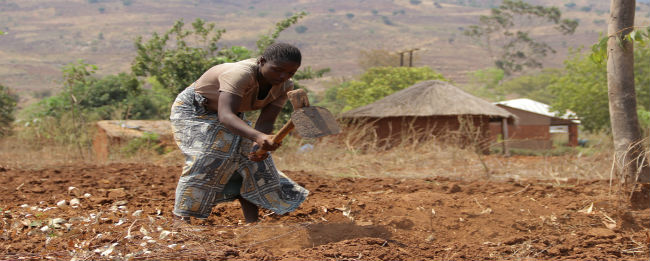By John Makina, Oxfam in Malawi Country Director
Imagine a woman who we’ll call Ellas Nkhoma. She’s worried about the future, especially what might happen to her children. Ellas has good reason to worry.
The 40-year-old single mother of five lives in Malawi’s Nsanje district and, for the past three years, her family has depended on humanitarian aid for survival because her harvest has dwindled.
In 2015, flash floods and dry spells forced Ellas to pull her eldest daughter out of school to help with the family’s chores: from gardening and taking care of her siblings, to fetching firewood and water as well as the wild fruits and mushrooms that help generate the family’s meagre income.
Ellas can no longer do this work alone because she has to walk long distances to find the things she needs. Recurrent floods have destroyed nearby forests and the rivers, which once ensured her region was an area of plenty, have dried up. Without her daughter’s help, Ellas’ family would starve.
This life-and-death battle for survival must feel very distant to Scotland’s politicians as they prepare to agree new climate change targets in the coming months. But, as the Country Director of Oxfam in Malawi, I see firsthand how climate change is destroying the lives of ordinary African farmers, particularly female headed households, like Ellas’.
Farming has become dangerously unpredictable. Delayed rains, prolonged dry spells, floods and pests now characterize most of the growing seasons in Malawi and many other countries in Africa.
Experts attribute all of these effects to climate change. As a coping mechanism, families are often left with no option but to sell their land and belongings just to survive. Children are malnourished and starvation is forcing far too many out of school.
In Malawi, almost 80 percent of the country’s population depends on agriculture for their livelihoods and with half of Malawians living in poverty, the majority of small scale farmers don’t have enough resources to adapt to climate change.
We know that while companies and individuals, particularly those in developed countries, continue to emit greenhouse gases the effects of climate change will continue to worsen. It’s a trend made worse by the growing economic gap between rich and poor.
Action by global leaders like Scotland to reduce green house emissions is therefore essential if we are to achieve the global goal of restricting warming to 1.5˚C. The targets embedded in the upcoming Climate Change Bill must be consistent with this goal.
In doing so, Scotland can show continued global leadership – just as it has in relation to climate justice.
While industrialised countries, like Scotland, must reduce future green house emissions, their help is also needed for those, like Ellas, who are impacted by existing damage. That means investment in the training and other supports which are essential to helping farmers adapt their lives.
Last year, the people of Scotland and the Scottish Government donated generously to Oxfam’s emergency appeal to help tackle famine in Malawi. The famine was caused by the El Niño weather phenomenon, exacerbated by climate change, which produced prolonged dry spells in some districts and flooding in others, destroying crops and decimating harvests.
6.5 million Malawians – about 40% of our population – were on the brink; facing severe food and water shortages. In the end, the Malawian Government declared a State of Natural Disaster.
We were immensely grateful for the aid from Scotland and other countries, which saved lives and helped avert immediate disaster. But emergency aid alone isn’t the solution.
Funding for adaptation must be increased and simplified. Alongside this, African governments, investors, and international financial institutions must significantly scale up investment in energy – especially renewable energy – to unlock Africa’s potential as a global low-carbon superpower.
In the meantime, those who did most to cause climate change must play their part.
Scotland has long been a great friend of Malawi and right now we Malawians need our friends. The Scottish Government has a real opportunity to make a difference through its new Climate Change Bill and we’ve all got a stake in it. You, me, and people like Ellas.
This article originally appeared in The Scotsman.
